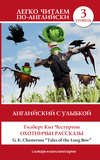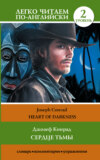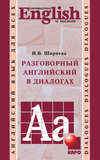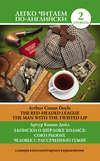Czytaj książkę: «Английский с улыбкой. Охотничьи рассказы / Tales of the Long Bow»
© Пирогов М. С., адаптация текста, комментарии, словарь, 2016
© ООО «Издательство АСТ», 2016
Chapter I. The unpresentable appearance of colonel crane
These stories tell about things recognized as impossible to do. If the writer just said that they happened, without saying how they happened, nobody would believe him, just like no one believes the story about the cow who jumped over the moon.
The first story begins on a straight road of bright houses in a suburb of a big city. The time was about twenty minutes to eleven on Sunday morning, when a procession of suburban families in Sunday clothes were going up the road to church. And the man was a very respectable retired military man named Colonel Crane, who was also going to church, as he had done every Sunday at the same hour for many years. He was dressed very elegantly for church as if for parade; but his clothes did not stand out in any way. He was quite handsome in a dry, sun-baked style; but his blond hair was of a colourless sort, and though his blue eyes were clear, they looked out a little heavily under lowered eyelids.
Colonel Crane belonged to the previous age in the history of England. He was not really old, indeed he was hardly middle-aged, and had received his last medals for the Great War1. But for a number of reasons he still belonged to the traditional type of the old professional soldiers, the way it had existed before 1914. Each church in those times had only one colonel as it had only one priest. It would be quite unjust to call him an old ruin; indeed, it would be much better to call him a bastion. Because he had remained in the traditions as firmly and patiently as he had stood under enemy fire. He was simply a man who had no taste for changing his habits, and had never worried about conventions enough to change them. One of his excellent habits was to go to church at eleven o’clock, so he went there every Sunday. And he did not know that there went with him something from an old-world atmosphere and a paragraph in the history of England.
When he came out of his front door on that particular morning, he was twisting a piece of paper in his fingers and frowning. Instead of walking straight to his garden gate he walked once or twice up and down his front garden, swinging his black walking-stick. The note had been given to him at breakfast, and it clearly described some practical problem which he needed to solve immediately. He stood for a few minutes looking at a red flower on of the nearest flower-bed; and then a new expression came to his bronzed face. Folding up the paper and putting it into his pocket, he walked round the house to the back garden. Behind the back garden there was a kitchen-garden, in which an old servant named Archer was working as a gardener.
Archer was also a bastion. Indeed, the two had stood together through a number of things that had killed many other good people. But though they had gone through the war together and had a complete confidence in each other, Archer could never lose the manners of a servant. He performed the duties of a gardener as if he were a butler. He really performed the duties very well and enjoyed them very much. Perhaps he enjoyed them so much because he was a clever Cockney2, and for him the country crafts were a new hobby. But somehow, whenever he said, “I have put in the seeds, sir,” it always sounded like, “I have put the drinks on the table, sir”; and he could not say “Should I pull out the carrots?” without seeming to say, “Would you like some red wine?”
“I hope you’re not working on Sunday,” said the Colonel, with a much more pleasant smile than most people got from him, though he was always polite to everybody. “You’re getting too fond of this agricultural hobby. You’ve become an uncultured peasant.”
“I was preparing to examine the cabbages, sir,” replied the uncultured peasant, in a very polite intonation. “Their condition yesterday evening did not look satisfactory to me.”
“Glad you didn’t spend the whole night near them,” answered the Colonel. “But it’s lucky you’re interested in cabbages. I want to talk to you about cabbages.”
“About cabbages, sir?” asked the other respectfully.
But the Colonel did not answer this question. He was suddenly looking in an abstracted way at another object in the vegetable plots in front of him.
We will never understand how a man’s soul and social type always affect his surroundings. Anyhow, the soul of Mr. Archer affected the kitchen-garden. It made his kitchen-garden different from any other. Mr. Archer was after all a practical man, and he liked his new profession much more than we would think.
So the kitchen-garden did not look like somebody’s backyard, it really looked like a corner of a farm in the country. All sorts of practical devices were used there to protect the vegetables and berries from birds. Strawberries were covered with nets, strings with feathers were stretched across the plots, and in the middle of the biggest plot stood an old and authentic scarecrow. Perhaps the only one who could compete with the scarecrow for the crown of the kitchen-garden was the shapeless South Sea idol, which marked the border of the garden’s territory. Colonel Crane would not have been such a typical officer of the old army, if he had not hidden somewhere a hobby connected with his travels. His hobby was folklore of the Oceanic islands and he had a souvenir from there in his garden. At the moment, however, he was not looking at the idol. He was looking at the scarecrow.
“By the way, Archer,” he said, “don’t you think the scarecrow needs a new hat?”
“I think it is hardly necessary, sir,” said the gardener gravely.
“But look here,” said the Colonel, “you should consider the philosophy of scarecrows. In theory, that thing is supposed to convince some rather simple-minded bird that I am walking in my garden. That thing with a terrible hat is me. Perhaps, it is a little bit sketchy. Some sort of impressionist portrait. But it is hardly likely to impress. A man with a hat like that would never be really firm with a sparrow. Conflict of wills, and all that, and I bet the sparrow would be the winner. By the way, what’s that stick tied on to it?”
“I believe, sir,” said Archer, “that it is supposed to represent a gun.”
“It is holding it wrong,” remarked Crane. “A man with a hat like that would miss for sure.”
“Do you want me to buy another hat?” asked the patient Archer.
“No, no,” answered his master carelessly. “Since the poor fellow has such a rotten hat, I’ll give him mine. Like the scene of St. Martin and the beggar3.”
“Give him yours,” repeated Archer respectfully, but very quietly.
The Colonel took off his polished top-hat and gravely placed it on the head of the Oceanic idol at his feet. It had a strange effect of making the grotesque piece of stone look alive, as if a goblin in a top-hat was grinning at the garden.
“Do you think the hat shouldn’t be quite new?” he asked almost anxiously. “Not usual among the best scarecrows, perhaps. Well, let’s see what we can do to make it a little older.”
He raised his walking-stick above his head and hit the silk hat with a loud smack, smashing it over the empty eyes of the idol.
“Softened with the touch of time now, I think,” he remarked, holding out what remained of the silken hat to the gardener. “Put it on the scarecrow, my friend; I don’t want it. You can be a witness that it’s no use to me.”
Archer obeyed like a robot. A robot with rather round eyes.
“We must hurry up,” said the Colonel cheerfully. “I was early for church, but I’m afraid I’m a bit late now.”
“Did you plan to attend church without a hat, sir?” asked the other.
“Certainly not. Most disrespectful,” said the Colonel. “Nobody should neglect to remove his hat when he enters church. Well, if I don’t have a hat, I will neglect to remove it. Where is your logic this morning? No, no, just dig up one of your cabbages.”
Once more the well-trained servant managed to repeat the word “Cabbages” with his own polite intonation; but he couldn’t say it very loudly at the moment.
“Yes, go and pull up a cabbage, please,” said the Colonel. “I must really be going; I believe I heard the clock strike eleven.”
Mr. Archer moved heavily in the direction of a plot of cabbages, where many monstrous contours and many colours were open to the eye; objects, perhaps, more worthy of the philosophic eye than is usually taken into account. Vegetables are curious-looking things and less trivial than they sound. If we called a cabbage a cactus, or some other exotic name, we might see it as an equally exotic thing.
The Colonel revealed these philosophical truths by dragging a great, green cabbage with its long root out of the earth, before the dubious Archer had time to do it. He then picked up a knife and cut short the long tail of the root. After that he cut out the inside leaves to create some empty space, and gravely reversing it, placed it on his head. Napoleon and other military princes have crowned themselves; and he, like the Caesars, wore a wreath that was, after all, made of green leaves or vegetation. There can be other historical parallels, of course, if the reader is ready to look at such a hat without judgement.
The people going to church certainly looked at it; but they did not look at it without judgement. They followed the Colonel as he walked almost cheerfully up the road, with feelings that no philosophy could for the moment describe. There seemed to be nothing to be said, except that one of the most respectable and respected of their neighbours, one who might even be called in a quiet way an example of good manners if not a leader of fashion, was walking solemnly up to church with a cabbage on the top of his head.
There was indeed no general action to meet the crisis. In their world a crowd could not gather to shout or to attack someone. No rotten eggs could be collected from their tidy breakfast-tables; and they were not those people who could throw old cabbage leaves at the cabbage. Each of these men lived alone and they could not create an angry crowd. For miles around there were no public houses4 and no public opinion.
When the Colonel approached the church porch and prepared respectfully to remove his vegetarian hat, he was greeted in a tone a little more cheerful than the everyday friendly manners of his neighbours. He responded to the greeting without embarrassment, and paused for a moment when the man who had spoken to him decided to continue speeking. This was a young doctor named Horace Hunter, tall, handsomely dressed, and confident in manners. Though his face was rather ordinary and his hair rather red, he was considered to have a certain charm.




























